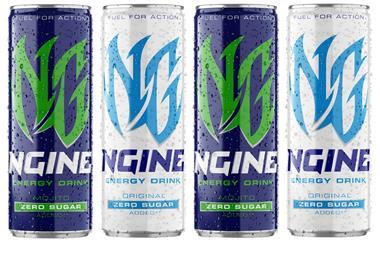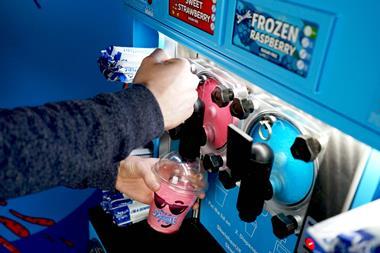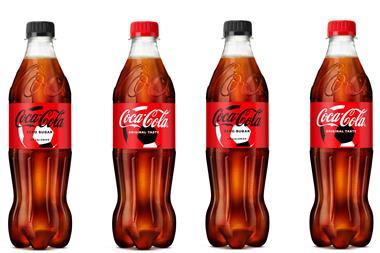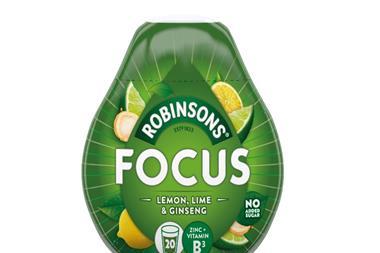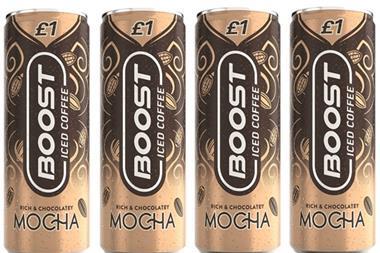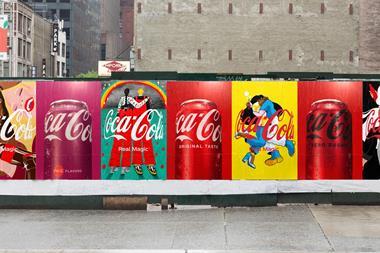Consumers have planty of excuses to party this summer, so retailers need to be ready with the soft drinks to suit.
On paper the signs are ominous: unemployment is at its highest for 17 years 86% of shoppers believe that the country is in recession (Britvic) food prices are rising and fuel prices are seemingly sky-rocketing. You no doubt read about the relentless economic gloom every day in the papers.
And yet, the cloud is silver-lined. First, despite falling consumer confidence, the soft drinks category remains buoyant. In 2011, soft drinks grew by 7% in value across take-home to reach nearly £7bn (Nielsen) - albeit driven by price increases and a rise in VAT - but volume growth was still up at 1%. The independent sector fared less well, with only 1% value growth and a 2% drop in volume. However, given the circumstances, the category is nevertheless holding up well within the sector, with health and value trends driving it forward.
GSK category marketing director Colin Seymour says people’s attitudes are becoming less austere than when the country first slid into recession a few years ago. “Consumers are feeling the squeeze even more than when we were in recession, but there’s a different reaction this time round. Before, there was a drive to the lowest price and people were taking an austere view, but there’s only so long you can go on like that,” he says. “Soft drinks are a part of what keep people sane - they’re a little treat.”
Coca-Cola Enterprises’ (CCE) wholesale trading director Darren Goldney adds: “In times when disposable income is under threat, consumers tend to continue buying brands they know and trust such as Coca-Cola.”
Retailer’s view
“The consumer is looking for value and anything that states that - be it pricemarked packs or own brand. Many people look at PMPs only now, and the pricemarked Coke is flying out.
“Energy drinks are the number one sellers for us, with Musgrave’s Dart energy drink the top-seller overall. There’s a huge difference in price between Dart and Red Bull. However, the big brands have a strong position in the market and Lucozade Orange is doing really well.
“The key thing to success in this category is deals. It’s really good for PMPs, and multi-buy purchases do well as the product won’t expire.”
Ramesh Shingadia, Londis Southwater, West Sussex
Bottlegreen managing director Simon Speers agrees that consumers have made it clear that there are certain elements they aren’t willing to sacrifice. “With the turbulent economic environment continuing we have certainly seen a trend towards consumers enjoying an increased number of ‘treats’ at home,” he adds.
New research from HIM’s Forward to the Future survey backs up the ‘big brand’ theory - it found that 27% of consumers think that convenience stores could improve their range of well-known brands, while 24% of retailers agree.
So retailers can capitalise on consumers’ enduring demand for soft drinks, but they can also tap into changing shopping habits. Amanda Grabham, head of brand marketing for Shloer, says: “People are shopping more locally and more frequently, so there’s a big opportunity for convenience stores. At a recent Nielsen meeting I attended, c-stores were talked about more than ever before.”
The cost of running a car is a significant factor, she adds. “People are becoming more and more aware of what they’re spending on transport. It impacts on top-up shopping, as shoppers are spending more in local shops than on fuel.”
Health kick
Health has become an increasingly important trend in soft drinks over the past 10 years, and one which has been resilient throughout the recession, says GSK’s Seymour. “We’ll see continued growth of products with functional health benefits, such as Ribena Plus,” he adds. Bottlegreen’s Speers says there is an increasing awareness of health issues that is leading people to seek more functionality in their drinks “and look for alternative non-alcoholic drinks that deliver on taste”.
The rapid growth of flavoured water in impulse (up 23.6% to £49m - Nielsen) reflects the demand for ‘wellness’ products. Volvic Touch of Fruit Original saw the highest growth in impulse, up 38% in value, while SoBe V Water maintained its upward momentum, growing 26% in value. Glaceau Vitaminwater also saw strong growth. “Health is a really important factor,” Seymour says. “But it means different things to different people - Diet Coke is healthy to some, but unhealthy to others because of the artificial sweeteners others prefer Coke because it doesn’t have artificial sweeteners. Some think juice is the healthy option, others think water, and some think sports drinks. So be careful to stock all options.”
Sports drinks hit with VAT

Under surprise proposals made by Chancellor George Osborne in this year’s Budget, some sports nutrition drinks will be subject to the 20%VAT rate for the first time from October 1. Currently, such drinks are zero-rated for VAT.
The government has announced it will hold a short consultation of just six weeks on the tax increase. It claims the rise will cost each business an average of £40, but an alliance of UK sports nutrition companies claims the impact assessment is “deeply flawed”.
The UK Specialist Sports Nutrition Alliance (UK SSNA) has pledged to fight what it calls a “health tax”. Clive Whitehouse, campaign director of the UK SSNA, said: “With the Olympics around the corner and an ever-growing national problem of obesity, it makes no sense for the government to hike up the cost of products designed to promote good health.
“By cutting the length of its consultation, the government clearly expects to force this through with Parliament away for the Easter holidays. This measure is ill-considered, unwelcome and will either push consumers away from healthy products or towards alternatives they find on the web that will be unregulated.”
The UK SSNA has launched a petition that it hopes will generate 10,000 signatures in an open letter to George Osborne, calling for him to reverse his decisions. Find it at www.petitionbuzz.com/petitions/vatonsportsdrinks.
Sports and energy drinks offer additional functional benefits, and the sub-category continues to surge ahead. Glucose/stimulant drinks, as defined in Britvic’s soft drinks report, grew by 17.9% in value and 18.8% in volume in impulse last year. Lucozade was the leading brand last year, growing 6% in value in take-home, followed by Red Bull, which grew by 5%. Monster Energy grew 46% year on year, becoming the fifth-placed brand by volume, while Mountain Dew energy grew in stature with value increasing 269% to £18m. The 440ml, six-pack and 1ltr formats helped drive the latter’s success.
Red Bull’s low-calorie variant, Red Bull Sugarfree, will be backed by £2m investment in 2012, which will target consumers who want a low-calorie, functional energy drinks.
Vimto Soft Drinks is responding to the health trend with the launch of its new WeightWatchers range with no added sugar. The product range has been developed following extensive consumer research that identified a genuine gap in the market for refreshing, low-calorie, premium-flavoured adult drinks, according to Vimto. “More and more consumers are opting for food and drink that will support healthier lifestyles and, as a result, there will be interest in low-calorie soft drinks options on the market,” says Vimto Soft Drinks marketing manager Emma Hunt.
Lucozade is tapping into the demand for energy and healthy drinks with the launch of Revive, which contains B vitamins and only 50 calories per bottle, and more recently Lucozade Caribbean Crush, which was part-inspired by the growth of exotic flavours. Says Seymour: “Exotic flavours are the fastest growing flavour over the past 12 months - growing by 22% - due to activity by some of our competitors, such as Levi Roots’ products and Rubicon. ”
In fact, 2012 will be characterised by NPD and new packaging, says Britvic customer management director Murray Harris. Seymour adds: “Soft drinks wouldn’t grow without NPD. Innovation from big brands makes the big difference.”
Shloer’s Grabham says there continues to be a lot of innovation around limited editions. “Last year our fruit punch and berry punch limited editions brought in 100,000 extra households to the brand.” Shloer this month brought back the Fruit Punch limited edition for the start of the barbecue season, in response to consumer and trade demand. It will be available until December.
Grabham says Shloer is an ideal alternative for adults looking for an alternative to alcohol. “There are lots of cases when people want something that allows them to be part of a social occasion when they’re not drinking alcohol. With Shloer, you can drink it in wine glasses.”
She says only one in four c-stores stock Shloer, even though it’s the number one adult soft drink and up 7% in the past 12 months. “We see an uplift every bank holiday,” she points out.
Shloer faces competition from Halewood International, which is launching the first ever carbonated soft drink to be made with named grape styles - chardonnay, merlot or sauvignon blanc. The product, Faith, is the adult soft drink that “women are crying out for”, asserts Halewood. Faith is available in three flavours: Faith White, which blends sauvignon blanc grapes with an infusion of elderflower and lemon Faith Rose, which combines chardonnay grapes with cranberry and raspberry flavours and Faith Red, which adds plum and blackcurrant notes to merlot grapes. Packaged in a 750ml clear glass bottle, consumers are advised to serve Faith in a large wine glass over ice. “We feel that the female market has been searching for a product like Faith for a while and the launch will drive the category further,” says director of innovation Richard Clark.
Meanwhile, Levi Roots has extended its range of soft drinks with a mango & pineapple-flavoured carbonate, building on its reputation for offering fruit-flavoured blends with a Caribbean twist, which recognised the aforementioned growing consumer thirst for exotic fruit flavours. Rubicon has launched its mango and guava variants in a 500ml PET bottle for on-the-go consumption. “Rubicon PET provides retailers with a major incremental profit opportunity as we are plugging the gap in the out-of-home market for an authentic exotic juice product,” says AG Barr head of marketing Adrian Troy.
Value and PMP
Consumers want to stick to the brands they know and love, but they also want value. The key is to find a balance between price and added benefits - and one of those keys is pricemarked packs, says Seymour. The Forward to the Future survey showed 74% of consumers believe convenience stores need to do more to offer value for money, and PMPs are a dependable solution. Research cited by CCE shows 98% of shoppers want PMPs, but only 78% of retailers stock them. CCE’s Goldney says: “Shoppers perceive PMPs as a special offer and this contributes to overall positive price and value perception, resulting in improved rate of sale with the added benefit of driving footfall in store for retailers. PMPs are particularly popular on soft drinks, to stock in chillers and on shelf, as they clearly drive purchase.” He adds that consumers are 44% more likely to buy a soft drink on impulse if it is a PMP (HIM PMP study 2011).
CCE has extended its range of PMPs for independent retailers across on-the-go and ‘future consumption’ packs. This includes Coke, diet Coke, Coke Zero and Cherry Coke cans at 59p PMP, and Powerade Sports 500ml 99p PMP. In future consumption CCE has rolled out pricemarked: MyCoke 2ltr £1.99 My Coke 1.25ltr £1.39 MyCoke 330ml can four-pack £1.89 Fanta, Sprite and Dr Pepper 2ltr £1.99 Schweppes Lemonade 2ltr £1.49 Ocean Spray 1ltr £1.35 and Five Alive 1ltr £1.29.
“We believe PMPs offer a strong sales proposition for retailers, and we are making a significant investment in 2012 behind PMPs across our soft drinks portfolio,” says Goldney. “In what is a hugely exciting year ahead with a massive summer of sport and celebration, this will help to support our independent customers and drive purchase.”
Tropicana has recently introduced limited-edition, £1 PMPs across its leading 330ml formats - Tropicana Original Tropicana Smooth and Copella English Apple - all of which will be available throughout the summer.
Vimto Soft Drinks also offers PMPs across most of its range, including a Sunkist £1 2ltr orange, Levi Roots 99p 500ml bottles and Vimto 2ltr Fizzy for £1.75. In addition, Sunkist has just launched an additional PET option for its existing Tropical Fruits flavour in the impulse market, which is available for a £1 PMP to encourage trial. “Value for money will remain an important factor when shoppers are choosing soft drinks and so retailers need to ensure they stock big-name brands that can offer added value such as PMPs, promotions and excellent profit margin,” says Vimto’s Hunt.
Summer of sport
A major opportunity for retailers is a summer rich in cultural and sporting events, including the Olympics, European Championships, Jubilee and the extra bank holiday. Retailers can capitalise on the celebratory summer by creating a theme in store, which will combine to raise the excitement levels and reinforce the message that the shop has everything in stock to enable celebrations at home, says Hunt. “Creating a display, which includes soft drinks and snacks in packs for sharing, will also encourage cross-purchasing,” she adds.
Retailers should also ensure availability of large sharing packs over the summer as consumers celebrate the major summer events at home, Hunt says. But availability in general is crucial, according to CCE’s Open More Business report. Research by HIM shows that 62% of shoppers who cite availability of soft drinks as a concern say they would either go without buying an alternative or buy the item elsewhere if it is out of stock.
Olympics partner CCE is launching a number of initiatives over the summer. Powerade, which is hydrating Olympic athletes, is running an exclusive on-pack promotion giving away the Powerade Olympic Games sports bottle free with every purchase. The bottle, which features the Olympic Games rings, is the same bottle that will be used in the Olympic Village. The promotion will run until the end of October and will feature on promotional packs of Powerade ION4 and Powerade Zero.
Schweppes Abbey Well is celebrating its status as the Official Water of the Olympics with a design conveying the quintessentially British heritage of the brand, which is taken from a single source in Northumberland, says CCE.
Water works
Danone Waters urges retailers to make additional space for water this summer as it is the most responsive soft drinks category to temperature changes. “The hotter its gets, the more water consumed,” says Danone Water marketing director Blandine Stefani. “Retailers should consider increasing the space on fixture and adding extra secondary space via dump bins and freestanding display units.”
Evian is the top seller with a 27% share (Nielsen), followed by Volvic with a 24% share. But Highland Spring and Buxton both saw volume increase by 2% and 3% respectively last year (Britvic Soft Drinks report).
Danone Waters recently introduced Volvic Juiced - a blend of fruit juice and Volvic natural mineral water - for consumers who “love flavoured drinks but can find them too heavy and are looking for a more refreshing drinking experience”.
Volvic Juiced is available in Orchard Apple and Cloudy Lemon and is available in 50cl PET bottles packed in cases of six with an rrp of £1.29 per bottle.
“Our consumer research confirmed that there is a consumer need and gap in the market for a drink that would combine all the taste appeal and vibrancy of a juice drink with the drinkability and thirst quenching properties of water,” says Stefani.
Squash - double or nothing?
Squash performed robustly in 2011, growing in value by 3.2% to £38.9m and by 0.8% in volume. In contrast, the category fell by 6.9% in volume in the grocery multiples sector (Nielsen). Ribena, ranked second to Robinsons, saw sales rise 15% in value on the back of extensive promotions, while Robinsons saw an overall decline of 4% as it continued its transition from single to double concentrate (Britvic Soft Drinks report).
Britvic commercial director, Impulse, Kate Fletcher, says demand for smaller pack sizes is driving the transition to double concentrate. Own label moved to double concentrate for point of difference, and Robinsons followed last April. “The smaller size is suitable for kids as they can pour themselves a drink more easily. It also reduces food miles so cuts costs,” she adds.
But the jury is out on double concentrate. Private label double concentrate has grown by 21.7% in the past 12 months, but branded squash has performed less well when moving into double concentrate. Robinsons double concentrate has declined by 5.9% over the past 12 months, whereas their single concentrate 1ltr size has remained in 3.2% growth, leaving the overall brand in decline.
Seymour says squash was lagging before the recession, but people are now discovering the old brands in the category because it’s “reassuring to buy something they know”. Bottlegreen managing director Simon Speers adds: “Premium cordials are the main driver of growth within the adult soft drink market and appeal to consumers looking for products that deliver on taste, quality and choice.”
Bottlegreen says its 11% year-on-year growth (Nielsen) is driven by its response to demand for new flavours and tastes from trusted brands. Last summer it launched Bottlegreen strawberry & elderflower cordial, which returns again between April and October. This year it has launched lime & coconut cordial, which is “perfect for entertaining and makes a great base for cocktails” says Speers.
Meanwhile, Vimto will be targeting millions of mums this summer in a nationwide campaign. The multi-million pound campaign, which is the latest phase of the brand’s Seriously Mixed Up Fruit series, will reach nearly 90% of mums in the UK. Vimto cordial is the ideal choice for mums, says the company’s Hunt. “It’s a good value, versatile drink that goes further for the family, and with its mixture of grape, blackcurrant and raspberry provides more variety than traditional single-flavoured squashes.” As part of the campaign the brand is releasing 25 million 30p money-off coupons. •
Great shakes
Milk consumption may be in decline, but sales of flavoured milk and milkshakes are on the up. The flavoured milk category is currently growing at 11.7% in value (Nielsen) and is forecast to account for 6.1% of the total market in 2012 (Mintel).
According to Yazoo, on-the-go consumption is driving this growth, with more than 52 million milkshakes consumed out of home every year.
The choice of flavoured milks has doubled over the past 18 months, from 16 lines in 2010 to an estimated 20 for 2012, says Helen Cridge, trade marketing manager at FrieslandCampina. As such, she urges retailers to stock a strong chilled range to help maximise sales opportunities, “particularly among young male adults looking for a treat to perk them up on the go”.
Yazoo has recently undergone a packaging makeover to create a bigger, bolder design and attract a wider audience. “Flavour is one of the key purchase triggers for consumers when choosing flavoured milk and it was vital that the new design brought each of the flavours to life,” says Cridge.
Yazoo has also responded to the trend for pricemarked packs by launching a new 99p PMP exclusively to the convenience sector, available to small stores until the end of August 2012.
To further encourage sales, the company has launched a multi-media campaign aimed at its young adult audience. The campaign, Shake Squad, is being supported by social media, with fans of Yazoo eligible to enter a competition running on Facebook to win one of eight weekly giveaways of £250 and a grand prize of £10,000.
Entrants are encouraged to upload their own Shake Squad-style photo or pose, to be voted on by other Facebook users in order to win.




















